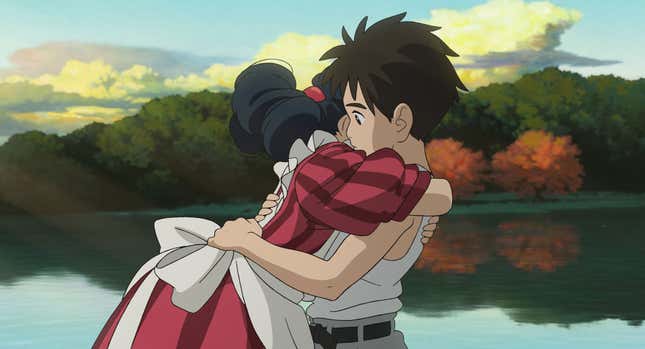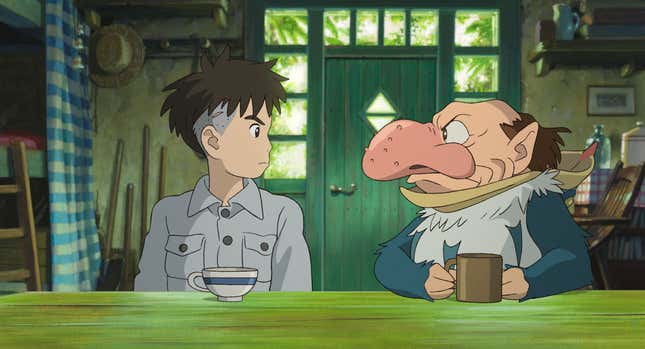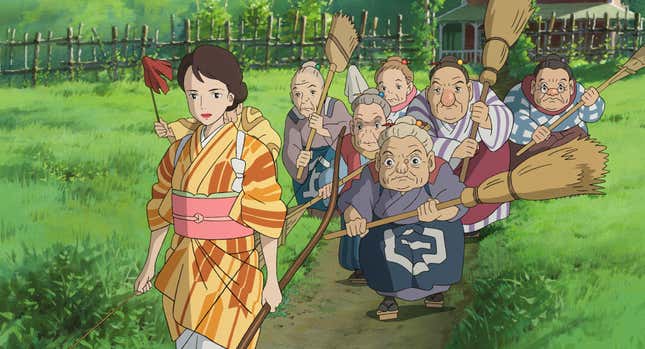Everything you love about the films of Hayao Miyazaki is on full display in his new film, The Boy and the Heron. The way the legendary animator creates the most evocative, gorgeous, and goofy worlds, then turns them into something poignant and meaningful. Characters that defy imagination thrill and delight, but also teach us something about ourselves. Curious, brave protagonists bask in that wonder and come out on the other side better off for it. It’s all there and then some in Miyazaki’s latest, and while it can often feel excessive, it’s nevertheless magical and thrilling.
Studio Ghibli, the company Miyazaki heads that brings all his films to life, famously chose not to use any images to promote The Boy and the Heron (or How Do You Live as it was called in Japan) so as to let audiences experience it for themselves. We, obviously, can’t do that entirely, but a certain caution in terms of plot specifics is warranted and rewarding, so this review will be spoiler-light.

In fact, an aversion to specifics almost certainly benefits a discussion of The Boy and the Heron. It is a film that is less about how individual pieces of its story all link together, and more about how it all makes you feel. Which, admittedly, is oftentimes something fans or critics say to excuse a movie that doesn’t quite work. I fully admit to being a mega-fan of Miyazaki’s work, and almost certainly am kinder to it for that. Nevertheless, though the escalating plot of The Boy and the Heron can be simultaneously jaw-dropping and jarring, you can’t help but imagine the filmmaker was aware that not every aspect comes together in a perfect manner. And such, it thrives more on emotion than logic.
There is, of course, a central, easy to follow story, at least at the start. It focuses on a young boy named Mahito (Soma Santoki) who, during World War II, suffers a terrible loss and leaves Tokyo with the remaining members of his family. Their new countryside home is serene, quiet, but has some unexplainable mystery about it—a mystery that begins to reveal itself when Mahito finds that a Grey Heron is paying him more attention than a bird probably should. Mahito follows that bird and from there, things go full Miyazaki, with a dash of Alice in Wonderland and a sprinkle of Wizard of Oz thrown in.

Mahito follows the Heron both because he’s a young boy unable to resist the possibility of adventure, but also because he’s looking for someone he lost. Both of those intentions are always present as Mahito’s journey takes him to places where logic begins to wash away. Where specific magical truths are established for just long enough before another sweeps in and overtakes it. As that happens, new, crucial, characters are constantly introduced, even up until the film’s final act, adding both a sense of discovery but also an undeniable lack of cohesion. The tonal shifts take some getting used to, especially in a moment about midway through where the film’s most seismic shift happens. We meet a whole new set of creatures, with a whole new set of rules infused with all manner of meaning, and it feels like you are watching a completely different movie than you were just five minutes ago. Miyazaki’s films are usually known for a more balanced transition between the real and the surreal when that sort of thing happens—a firmer cohesion holding all of it together. That is not a strength, or even a concern, of The Boy and the Heron. The film forces you to make a choice. Do you get frustrated that all of this feels so happenstance? Or do you get on the ride and see where it takes you?
A full enjoyment of The Boy and the Heron is crucial to that choice. Because, by the end, it’s possible there was no straightforward rhyme or reason to the beats of Mahito’s journey, just its destination. Each new creature or character he encounters, every new story thread he faces, they’re all so gloriously imaginative, there’s simply no way for it all to make perfect sense. On the other hand, they do make a smidge of sense when you consider a few things. One: for a time, Miyazaki imagined this might be his last film, and maybe that meant he wanted to get every thought or image he had in his head onto the screen no matter what. Two: that Mahito’s journey is about growing up in the face of tragedy, and growing up can often feel as manic, scary, and random as what we’re seeing. If the aim was for Miyazaki to fill this film with everything he had left in his mind, and use it as his mirror about dealing with trauma as a child, things start to fit.

That’s pure justification and speculation though. There’s little denying that, objectively, The Boy and the Heron does not feel as perfectly constructed as Miyazaki’s previous films. What makes up for that, however, is the sheer awe-inspiring beauty of what’s on screen. The worlds of The Boy and the Heron, and especially the creatures created, are some of the most beautiful things Miyazaki has ever done. At each turn, you’ll laugh, you’ll gush, you’ll want to jump into the screen and play with all of them. Plus, that the film’s animation looks as stunning as it does is both fully expected from a Studio Ghibli film, but should never be overlooked.
When you’re a filmmaker who has, maybe inarguably, never made a bad movie, expectations can’t be incredibly high going into your latest work. The Boy and the Heron faces that challenge and so, when compared to some of Miyazaki’s masterpieces—especially so in the context that this was to be his final film, at least for a long while—certainly falls short a little bit. And yet this is still undeniably art made by maybe our greatest living filmmaker, in live-action or animation. He’s working at the top of his game, providing a story and world that will leave you breathless and fulfilled. It’s jam-packed both in theme and emotional resonance, but also in its ideas and sheer beauty on the screen. At times the film is messy, sure—but it’s a beautiful mess that blossoms into an unforgettable, magical, experience that you’ll almost certainly want to revisit again and again, just so you feel that pure, unadulterated, unfiltered Miyazaki magic.
The Boy and the Heron had its U.S. IMAX premiere this week at the Animation is Film Festival. It opens in the U.S. on December 8.
Want more io9 news? Check out when to expect the latest Marvel, Star Wars, and Star Trek releases, what’s next for the DC Universe on film and TV, and everything you need to know about the future of Doctor Who.
Trending Products

Cooler Master MasterBox Q300L Micro-ATX Tower with Magnetic Design Dust Filter, Transparent Acrylic Side Panel…

ASUS TUF Gaming GT301 ZAKU II Edition ATX mid-Tower Compact case with Tempered Glass Side Panel, Honeycomb Front Panel…

ASUS TUF Gaming GT501 Mid-Tower Computer Case for up to EATX Motherboards with USB 3.0 Front Panel Cases GT501/GRY/WITH…

be quiet! Pure Base 500DX Black, Mid Tower ATX case, ARGB, 3 pre-installed Pure Wings 2, BGW37, tempered glass window

ASUS ROG Strix Helios GX601 White Edition RGB Mid-Tower Computer Case for ATX/EATX Motherboards with tempered glass…










